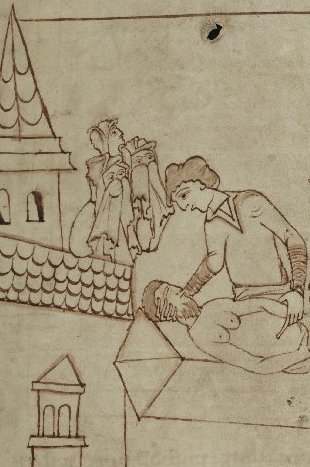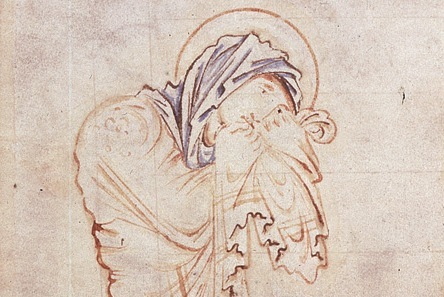
The Wife’s Lament is a poem about a zombie. It is also a riddle about a sorrowful woman who has been separated from her husband and exiled into the wilderness. Or is it a song about a vengeful nun’s curse? This spellbinding piece of Anglo-Saxon verse from the Exeter Book does not allow us to settle upon any of the above scenarios, and neither does it allow us to rule any of them out. The poem is remarkable as a rare example of a first-person narrative in a female voice, and its enigmatic quality brings scholars and translators back to it perennially in order to appreciate the beauty and significance of the poem and shed more light on its mysteries. The ambiguity of the poem also makes it a joy to translate, as it opens a space for unfettered creativity. For my contribution to The Chequered Board’s ongoing series on Anglo-Saxon poetry in translation, I have taken on The Wife’s Lament as an exploratory exercise in order to experiment with creative translation as a way of interpreting Old English poetry.
In his introduction to The Word Exchange: Anglo-Saxon Poems in Translation, Greg Delanty notes that “We tend to think of Anglo-Saxon poetry as issuing from the uniform voice of the great poet Anonywulf, especially once the poems are translated by the learned Master Olde English” (xv). The uniformity of many Old English poems in translation is due to the collective goal of many translators in producing as accurate a translation as possible. While this style of rendering an ancient poem into modern English is essential for learners of Old English to grasp the sense of the original language, it does not leave much room for the creative or interpretive voice of the translator. In the hands of modern poets like Burton Raffel and Eavan Bolan, however, an Old English poem can take on a new life of its own. When Raffel sets the woman’s exile in “a convent / Of wooden nuns” (15-16) he draws a comparison between the claustrophobic feeling of the woman and practices of enclosure surrounding Anglo-Saxon nuns. Boland highlights the possibility that the poem’s conclusion is an aggressive speech act by translating the wife’s speech as an explicit curse: “Let him be cast from his land alone/ By an icy cliff in a cold storm” (64-65). These versions of The Wife’s Lament add welcome voices to the conversation surrounding the poem, and show that poetic translation that experiments beyond a literal interpretation of the poem can be a legitimate way to approach its complexities from a fresh and intellectually productive perspective.
In my own approach, I wanted to address Delanty’s complaint by using a form that diverged from the imitation of alliterative verse often found in translations of Anglo-Saxon poetry. I settled on the ballad stanza because its regular and repeated rhyme scheme allowed me to approximate some of the sonic effects of alliteration, while also referencing other aspects of the Wife’s Lament that makes it stand out from other Old English poems. An example of a few ballad stanzas from the translation is excerpted below, as well as a reading of the original Anglo-Saxon verse:
I sadly sing this song of mine,
Of my journey of misery.
I tell the tale as I grow old
True now as will ever be.
My exile-journey is full of woe
Since my lord went out to the deep,
My dawn-cares have been full of him
And all I have done is weep. (1-8)
Though the late medieval and early modern ballad stanza seems like an anachronistic fit with an Anglo-Saxon poem, the musical verse form represents a centuries-old tradition of female narratives of sorrow, from “Bonny Barabara Allan” to Dorothy Parker’s “The Dark Girl’s Rhyme.” Instead of simply categorizing the Wife’s Lament with all other Anglo-Saxon poems or Old English elegies, the ballad encourages readers to consider the poem in a more thematic genre category.
I also wanted to do homage to Raffel’s brilliant translation by imagining this song as the tale of a woman who is forced into a religious community when her husband leaves on a long sea journey, and is not recalled upon his return. She feels exiled and alone because she has been separated from her kin, and the religious life seems foreign to her. The final section of the text constitutes advice for others in her situation to cope with the monastic way of life. Though the translation is still left open to a variety of scenarios, I have made allusions to Raffel’s “convent of wooden nuns” through the use of “cloister” (17) and the notion of spending one’s time in enclosure in contemplation of heaven (the “Joyous House” [53]) and Christ (“Love” [56]).
The resulting translation is by no means an accurate or aesthetically comparable rendering of the original piece, but I hope it can encourage others to flex their creativity when approaching the translation of Anglo-Saxon poetry. The corpus of Old English poetry is a rich and diverse group of poems, and we can only enhance our appreciation of these works by hearing them retold in a multiplicity of voices that highlight the zombies, nuns, wilderness, and curses in each of them.
Leanne MacDonald
PhD Candidate
Department of English
University of Notre Dame
Works Cited
Boland, Eavan. “The Wife’s Lament.” The Word Exchange: Anglo-Saxon Poems in Translation, ed. Greg Delanty and Michael Matto. New York: W. W. Norton & Company, 2010. Print.
Delanty, Greg and Michael Matto, The Word Exchange: Anglo-Saxon Poems in Translation. New York: W. W. Norton & Company, 2010. Print.
Raffel, Burton. “A Woman’s Message and the Husband’s Message.” Prairie Schooner 32.2 (1958): 125-127. Print.

